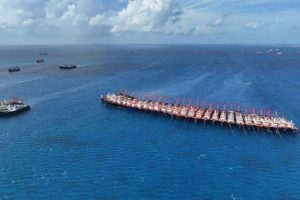ASEAN HEADLINE-ASIA GEOPOLITICS | AFP hits ‘deceptive’ China claims on ship collision
A Chinese Coast Guard ship sails beside the boat number 2 of the Atin Ito civilian resupply mission in the vicinity of the Bajo de Masinloc at the West Philippine Sea on May 15, 2024.
.
. MANILA, Philippines — Beijing’s account of the collision of one of its coast guard ships with a Philippine supply vessel near Ayungin Shoal was “deceptive” and “misleading,” the Armed Forces of the Philippines (AFP) said yesterday.
MANILA, Philippines — Beijing’s account of the collision of one of its coast guard ships with a Philippine supply vessel near Ayungin Shoal was “deceptive” and “misleading,” the Armed Forces of the Philippines (AFP) said yesterday.
“The main issue remains to be the illegal presence and actions of Chinese vessels within the Philippines’ exclusive economic zone (EEZ), which infringes on our sovereignty and sovereign rights,” AFP Public Affairs Office chief Col. Xerxes Trinidad said in a statement.
“The AFP will not discuss operational details on the legal humanitarian rotation and resupply mission at Ayungin Shoal, which is well within our EEZ,” he added.
He was referring to reports on Chinese media blaming the Philippines for the collision which supposedly happened before 6 a.m. yesterday near Ayungin Shoal.
The China Coast Guard (CCG) claimed the Philippine vessel, enroute to Ayungin Shoal to deliver provisions to troops on the BRP Sierra Madre, “illegally” entered the area.
The incident took place two days after Beijing’s supposed enforcement of a “maritime regulation” allowing its coast guard to seize foreign ships “that illegally enter China’s territorial waters” and to detain foreign crews for up to 60 days.
The law renewed a reference to a 2021 legislation that says China’s coast guard can fire upon foreign ships if necessary. Aside from the Philippines, Vietnam and Taiwan have said they would not recognize the regulation.
Trinidad maintained it was the CCG’s acts of intimidation that were escalating tensions in the region.
After initially declining to comment on the matter, Philippine Coast Guard (PCG) spokesman Commodore Jay Tarriela said, “We are not in a position to provide any details on this issue. This is not a PCG operation.”
Meanwhile, Defense Secretary Gilberto Teodoro Jr. vowed yesterday that China’s dangerous and reckless behavior in the West Philippine Sea will be resisted by the AFP.
Teodoro said China’s “behavior contravenes their statements of good faith and decency.”
“We will exert our utmost in order to fulfill our sworn mandate to protect our territorial integrity, sovereignty, and sovereign rights,” Teodoro said. “It should now be clear to the international community that China’s actions are the true obstacles to peace and stability in the South China Sea.”
For House Deputy Minority Leader France Castro, China was peddling “lies” about the collision.
“China’s statement projecting the collision as a way to control the supposed illegal entry of Philippine vessels in the area reeks of its characteristic deception when it comes to maritime issues in the West Philippine Sea,” Castro of ACT Teachers party-list said.
She maintained the incident was “a clear act of harassment and violation of our sovereign rights” and intended to preserve China’s “persistent unlawful presence and illegal activities in the WPS.”
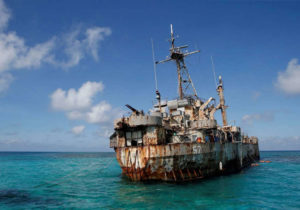
.
China blames Philippines
China was demanding the removal of the Sierra Madre from Ayungin Shoal, supposedly as part of a “gentleman’s agreement” with the previous Duterte administration, in exchange for continuing dialogue with the Philippines.
But China has no right to be in Ayungin Shoal, a low-tide elevation that lies within the Philippines’ EEZ and continental shelf in accordance with the 1982 United Nations Convention on the Law of the Sea and as affirmed by the 2016 arbitral award.
Officials said the Philippines has not entered into any agreement abandoning its sovereign rights and jurisdiction over its EEZ and continental shelf.
The CCG said in a statement on the social media platform WeChat the Philippine supply ship “ignored China’s repeated solemn warnings … and dangerously approached a Chinese vessel in normal navigation in an unprofessional manner, resulting in a collision.”
“The Philippines is entirely responsible for this,” it added.
China has become increasingly assertive in pressing its claim to virtually the entire South China Sea, which has led to a rising number of direct conflicts with other countries in the region, most notably the Philippines and Vietnam.
The territorial disputes have strained relations and sparked fears the conflict could bring China and the US, a longtime treaty ally of the Philippines, into a military confrontation. Washington lays no territorial claims to the busy seaway, a key global trade route, but has warned that it is obligated to defend the Philippines if Filipino forces, ships and aircraft come under an armed attack in the South China Sea.
The South China Sea is now regarded as a flashpoint in Asia and a delicate fault line in the longstanding US-China rivalry in the region.
Indonesia has also confronted Chinese coast guard and fishing fleets in the past in the gas-rich waters off the Natuna islands in the fringes of the South China Sea where it blew up Chinese fishing boats it had taken under custody.
Its navy also fired warning shots at Chinese vessels straying into what Jakarta regards as its EEZ.
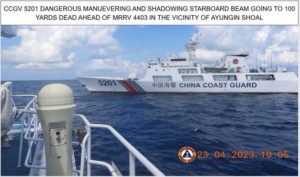
Increased presence
In Panatag (Scarborough) Shoal, Filipino fishermen were having difficulty plying their trade due to increased presence of CCG and militia vessels.
“I want to clarify that nobody fish in the Bajo de Masinloc as of now, since the declaration of fishing ban effective June 15, our Scarborough fishermen could not operate near as the Chinese Coast Guard and Chinese militia surrounded the area,” New Masinloc Fishermen Association president Leonardo Cuaresma said in a radio interview, referring to Panatag by its other name.
Cuaresma added that even the commercial fishing vessels cannot harvest the payao installed near Panatag Shoal.
“Nobody can enter the Bajo de Masinloc. Our commercial fishing vessels are still operating but they can no longer harvest their payao as the Chinese Coast Guard blocked them,” Cuaresma added.
He said small fishers operate at a distance of 30 nautical miles from Bajo de Masinloc to prevent encounters with CCG and militia vessels.
“There were times that there were sightings of Chinese Coast Guard even at the distance of 30 nautical miles, our fishers try to avoid them once they see the ships of Chinese Coast Guard,” he added.
But he said the fisherfolk would continue to sail despite threat of arrest from the CCG.
“We will be happy if we will be escorted by the Philippine Coast Guard but we also know the limitations of the government, that’s why the number (of our Coast Guard) in Scarborough is not that big,” he added.
He said that commercial fishing vessels placed their payaos in other areas in the West Philippine Sea.
“There were instances that payaos in Bajo de Masinloc were destroyed after being hit by the Chinese Coast Guard ships,” Cuaresma noted.
Cuaresma said fisherfolk have no choice but to continue to sail as fishing is their only source of livelihood. “We will continue to operate as we have no other sources of income,” he added.
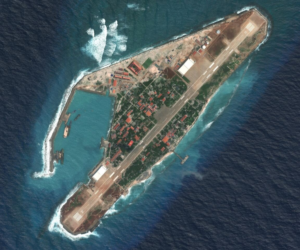
PCG ships
But in a statement, PCG commandant Admiral Ronnie Gil Gavan said he had ordered the deployment of two of PCG’s multi-role response vessels to Panatag Shoal to secure Filipino fishermen.
BRP Malapascua and BRP Sindangan have been sent out to “patrol and ensure the safety of Filipino fishermen at 30.8 nautical miles southeast off Bajo de Masinloc,” said PCG spokesman Rear Admiral Armand Balilo.
He added they were constantly communicating with Filipino fishermen in the area not only to protect them but to check on their health condition and on the progress of their fishing activities as well.
“As per the directive of Admiral Gavan, Coast Guardians assured them that the PCG will uphold their safety and provide security during fishing activities,” Balilo said, referring to the fishermen.
“Our people are there, our ships are there at Panatag Shoal,” said Balilo.
“The instruction of Coast Guard Commandant, Admiral Ronnie Gil Gavan, is for us to stay put in the area (Panatag Shoal). But there are instances such as when our vessel needs to reprovision, but as much as possible the Philippine Coast Guard’s presence will always be there,” he added.
Interior Secretary Benhur Abalos said the Philippine National Police Maritime Group will also help provide protection to the Filipino fishermen.
“We have PNP (maritime) patrol but as we all know, we only have limited boats but of course, they are there to provide assistance to all, especially to our fishermen,” Abalos said in an interview over radio dzBB.
“As of now, we are monitoring, especially on the grassroots. We are also coordinating with other agencies like the Department of Social Welfare and Development,” he added. — Bella Cariaso, Sheila Crisostomo, Ghio Ong

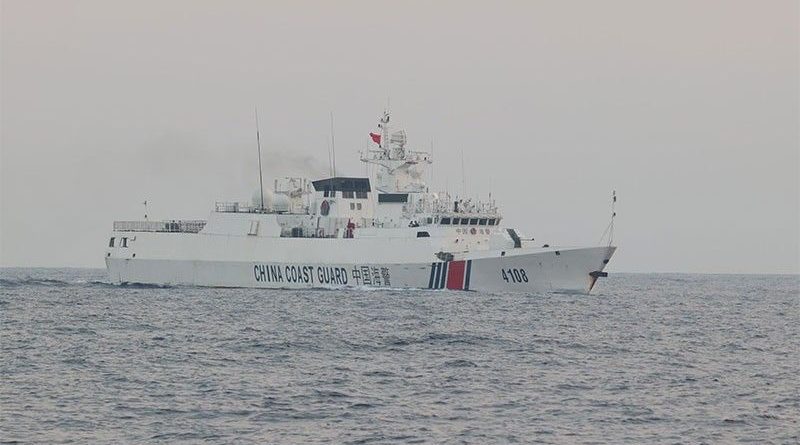
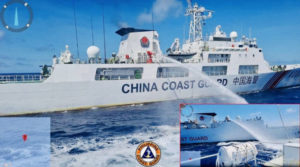
 Memento Maxima Digital Marketing
Memento Maxima Digital Marketing